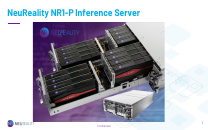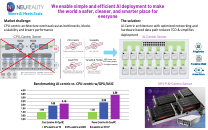
NeuReality
Founded Year
2019Stage
Series A - II | AliveTotal Raised
$63MLast Raised
$20M | 6 mos agoMosaic Score The Mosaic Score is an algorithm that measures the overall financial health and market potential of private companies.
-94 points in the past 30 days
About NeuReality
NeuReality specializes in AI-centric solutions within the semiconductor industry, focusing on optimizing and scaling AI workflows. The company offers a system-level approach with products like its network addressable processing unit (NAPU) and integrated software tools designed to streamline AI deployment and management. NeuReality's solutions cater to the needs of cloud computing environments and infrastructures, aiming to AI application scalability and efficiency. It was founded in 2019 and is based in Caesarea, Israel.
Loading...
NeuReality's Product Videos


NeuReality's Products & Differentiators
NR1-P
NeuReality’s novel AI-centric inference platform NR1-P is a new type of AI Server-on-Chip (SoC). It includes 16 Dual-slot FHFL FPGA cards with 25Gbe each installed in a 4U PCI carrier server. Each NR1-P performs with true linear scalability running AI-over-Fabric with Native k8S support
Loading...
Expert Collections containing NeuReality
Expert Collections are analyst-curated lists that highlight the companies you need to know in the most important technology spaces.
NeuReality is included in 2 Expert Collections, including Artificial Intelligence.
Artificial Intelligence
14,769 items
Companies developing artificial intelligence solutions, including cross-industry applications, industry-specific products, and AI infrastructure solutions.
Semiconductors, Chips, and Advanced Electronics
7,153 items
Companies in the semiconductors & HPC space, including integrated device manufacturers (IDMs), fabless firms, semiconductor production equipment manufacturers, electronic design automation (EDA), advanced semiconductor material companies, and more
NeuReality Patents
NeuReality has filed 9 patents.
The 3 most popular patent topics include:
- artificial intelligence
- machine learning
- deep learning

Application Date | Grant Date | Title | Related Topics | Status |
|---|---|---|---|---|
7/1/2020 | 3/5/2024 | Distributed computing architecture, Learning methods, Machine learning, Artificial intelligence, Educational psychology | Grant |
Application Date | 7/1/2020 |
|---|---|
Grant Date | 3/5/2024 |
Title | |
Related Topics | Distributed computing architecture, Learning methods, Machine learning, Artificial intelligence, Educational psychology |
Status | Grant |
Latest NeuReality News
Aug 13, 2024
Major AI Act Will Heavily Impact The Unprepared & Indecisive Last week, the EU’s AI Act finally went into effect following final approval from EU member states, lawmakers, and the European Commission. The AI Act aims to govern how companies develop, use, and apply AI. This will be done via a risk-based approach to regulation. Each AI application will be monitored and categorized based on the “risk it poses to human society.” For applications that can threaten human privacy or safety, the application must follow strict guidelines and adhere to EU AI monitoring policies. Some of the guidelines for AI applications include adequate risk assessment, high-quality training data sets, bias mitigation, logging AI activity, mandatory sharing of documents with authorities, and more. How does NeuReality fit into the landscape? As an infrastructure company, NeuReality offers a distinctive inference and serving solution designed to boost the operational efficiency of AI applications. With insights gained from real-world AI deployments across the globe, NeuReality has developed robust capabilities within its platform. This positions the company uniquely to help organizations safeguard user data effectively. With that said, I wanted to share commentary from Iddo Kadim , field CTO at NeuReality , to support your reporting on this AI legislation. Please find his commentary below, and if you would like to discuss this in further detail, I can set up a phone call. “Historically, there has been extensive debate between the goal of making money, with innovation as its proxy, and responsibility to society,” commented Iddo Kadim, field CTO at NeuReality . “The intent of the AI Acts encourages and rewards responsible AI innovation. As with any regulation, the actual interpretation and implementation will determine how successful the regulation is in achieving their goal. As of now, it is yet to be seen. Ultimately, sustainable and cost efficient AI solutions should be the goal of organizations across the globe. For society to trust AI it must be safe, secure and sustainable. How could societies really trust an AI that makes the planet less habitable and society more dangerous? We must create an environment in which the companies with no regard for people or planet will find themselves struggling more than the rest. I am happy to see a good effort on protecting people’s privacy when working with AI but more must be done for the planet in terms of AI development. Overall, the companies most affected by these regulatory measures are the ones that build AI applications. The more risk associated with their application, there will be more eyes on their product to ensure it meets regulatory requirements or run the risk of devastating consequences, both financially and reputation. Companies that build infrastructure for AI development and deployment can help companies that build AI applications by implementing and enforcing privacy, security controls and helping minimize energy consumption. The AI Act might lead to a few possible outcomes which include: Companies that operate outside the EU could delay entering it, or avoid it altogether. Some companies may implement their products with region specific feature sets. Companies that choose to meet the requirements might incur additional costs at first, especially if implementing new systems and measures that were not put in place before, but those incremental costs are likely to be less significant over time as they become part of the standard operation for these companies. The act would deter very bad actors from “adding” to the most dangerous or unintended consequences of AI – like AI driven cyberattacks, ransomware. If GDPR is a reference for this regulation, then ultimately a large majority of companies will learn what it takes to adhere to the new regulation and simply integrate them as a standard detail of how they do business.” Sign up for the free insideAI News newsletter . Join us on Twitter: https://twitter.com/InsideBigData1 Join us on LinkedIn: https://www.linkedin.com/company/insideainews/ Join us on Facebook: https://www.facebook.com/insideAINEWSNOW
NeuReality Frequently Asked Questions (FAQ)
When was NeuReality founded?
NeuReality was founded in 2019.
Where is NeuReality's headquarters?
NeuReality's headquarters is located at 14 Khalamish Street, Caesarea.
What is NeuReality's latest funding round?
NeuReality's latest funding round is Series A - II.
How much did NeuReality raise?
NeuReality raised a total of $63M.
Who are the investors of NeuReality?
Investors of NeuReality include Varana Capital, OurCrowd, Cardumen Capital, Alumni Ventures, Cleveland Avenue and 10 more.
Who are NeuReality's competitors?
Competitors of NeuReality include Groq and 2 more.
What products does NeuReality offer?
NeuReality's products include NR1-P and 1 more.
Who are NeuReality's customers?
Customers of NeuReality include XILINX.
Loading...
Compare NeuReality to Competitors

Blaize specializes in AI processing solutions with a focus on AI hardware architecture and software platforms for various industries. It offers a full-stack hardware architecture and a no-code software platform designed to simplify and accelerate the deployment of AI applications from data centers to the network's edge. Blaize primarily serves sectors such as automotive, smart vision, and enterprise computing. Blaize was formerly known as ThinCI. It was founded in 2010 and is based in El Dorado Hills, California.

Mythic is a high-performance analog computing company specializing in AI acceleration technology. Their products include the M1076 Analog Matrix Processor and M.2 key cards, which provide power-efficient AI inference for edge devices and servers. Mythic primarily serves sectors that require real-time analytics and high data throughput, such as smarter cities and spaces, drones and aerospace, and AR/VR applications. Mythic was formerly known as Isocline Engineering. It was founded in 2012 and is based in Austin, Texas.

Cerebras focuses on artificial intelligence (AI) work in computer science and deep learning. The company offers a new class of computers, the CS-2, which is designed to train AI models efficiently, with applications in natural language processing (NLP), computer vision, and computing. Cerebras primarily serves sectors such as health and pharma, energy, government, scientific computing, financial services, and web and social media. It was founded in 2016 and is based in Sunnyvale, California.
Vathys is a company focused on the development of deep learning processors in the technology and artificial intelligence industry. The company's main offering is a high-performance deep learning processor that is designed to be significantly more efficient than other similar processors. Vathys primarily serves the artificial intelligence and machine learning sectors. It is based in Portland, Oregon.

Another Brain operates as a company focusing on the development of artificial intelligence (AI) technologies. It specializes in the development of Organic AI, a new generation of artificial intelligence technology within the AI industry. The company offers a vision quality control solution called Blue Phosphor that uses AI algorithms for intelligent defect detection in industrial supply chains. It was founded in 2017 and is based in Paris, France.
ChipIntelli is a leader in the intelligent voice chip industry, focusing on providing solutions for more natural, simple, and smart human-machine interactions. The company offers a range of intelligent voice chips and solutions that cater to various applications, including offline voice recognition and voice-enabled smart devices. ChipIntelli's products are primarily used in the smart home appliances, smart lighting, smart automotive, and smart education/entertainment sectors. It was founded in 2015 and is based in Chengdu, Sichuan.
Loading...